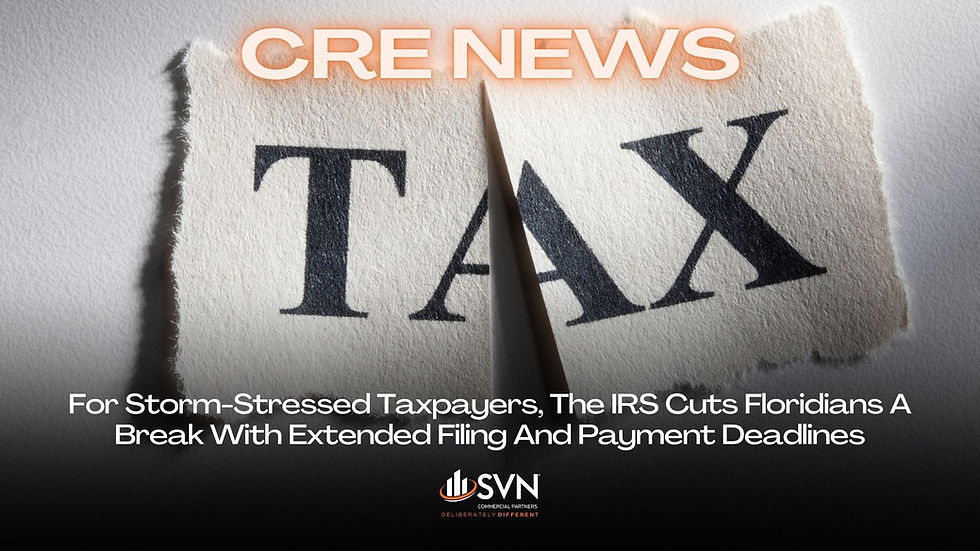- SVN | Commercial Partners .
- Oct 15, 2024
- 3 min read

The IRS, in what amounts to a practical gesture to thousands of Florida taxpayers who lost their homes, shuttered their businesses or were in some other way affected by Hurricanes Helene and Milton, is extending a variety of filing and tax payment deadlines into the next year.
In the wake of two more hurricanes and the destruction they wrought, the Internal Revenue Service is giving individuals and businesses in 51 Florida counties some leeway to file their returns and pay their taxes.
The IRS, in an announcement last Friday, said storm-afflicted taxpayers have until May 1, 2025, “to file various federal individual and business tax returns and make tax payments.”
It was made possible by a disaster declaration issued last week by the Federal Emergency Management Agency and covers individuals and households that reside or operate a business in one of the storm-impacted counties.
Wide coverage
In South Florida, the declaration covers Broward, Palm Beach, and Miami-Dade counties.
The other counties include Alachua, Baker, Bradford, Brevard, Charlotte, Citrus, Clay, Collier, Columbia, DeSoto, Dixie, Duval, Flagler, Gilchrist, Glades, Hamilton, Hardee, Hendry, Hernando, Highlands, Hillsborough, Indian River, Lafayette, Lake, Lee, Levy, Madison, Manatee, Marion, Martin, Monroe, Nassau, Okeechobee, Orange, Osceola, Pasco, Pinellas, Polk, Putman, Sarasota, Seminole, St. Johns, St. Lucie, Sumter, Suwannee, Taylor, Union, and Volusia.
“Combined with earlier tax relief provided for taxpayers in counties affected by Hurricane Debby and Hurricane Helene, affected taxpayers in all of Florida now have until May 1, 2025, to file various federal individual and business tax returns and make tax payments, including 2024 individual and business returns normally due during March and April 2025, and 2023 individual and corporate returns with valid extensions and quarterly estimated tax payments,” the IRS statement says.

The Internal Revenue Service is helping Florida storm victims by extending deadlines for both individual and business tax return filings, as well as the payment of taxes owed. (Patrick Semansky/AP file).
For example, filing and payment deadlines falling on or after Oct. 5, 2024, and before May 1, 2025, are granted additional time to file through May 1, 2025.
The May 1, 2025, filing deadline, the IRS says, now applies to:
Any individual or business that has a 2024 return is normally due during March or April 2025.
Any individual, C corporation, or tax-exempt organization that has a valid extension to file their calendar year 2023 federal return. (However, tax payments on those returns are not eligible for the extra time because they were due last spring before the hurricane occurred.)
Quarterly estimated tax payments for 2024 are normally due on Jan. 15, 2025, and 2025 estimated tax payments are normally due on April 15, 2025.
Quarterly payroll and excise tax returns are normally due on Oct. 31, 2024, Jan. 31, 2025, and April 30, 2025.
Make no mistake, the IRS intends to collect what is due no matter what the deadline. Over the summer, the agency announced it had reached the $1 billion mark from a series of initiatives designed to collect bills that were considered “past due.”
For many taxpayers currently on extension from the standard mid-April filing deadline, the reprieve was scheduled to end Tuesday.
“Tomorrow is the extended deadline due date for individual returns and for calendar year corporations,” said Cesar Estrada, regional tax and business service partner in charge at the Fort Lauderdale office of Marcum, the national business advisory firm based in New York.
Easing the pain
Estrada said many of Marcum’s clients are not taking advantage of the new round of extensions. “A lot of people just want to get it out of the way,” he said.
But the storms clearly have made more time a necessity.
“We have offices in Tampa, and what I am finding is that there are a lot more taxpayers in that area affected because of the back-to-back hurricanes,” he told the South Florida Sun-Sentinel on Monday. “There is a larger number of clients in Tampa than there are here in the South Florida area.”
Those clients who are taking advantage are doing so for a variety of reasons. They needed to evacuate their neighborhoods, assess damages, find new housing, call insurance companies, and retrieve and/or restore lost or damaged records — though the use of electronic record-keeping has cut down on those instances.
The people hired to prepare tax returns have also seen their lives disrupted, Estrada said.
“We did have personnel experience significant flooding in their homes,” he said. “Our team came together and we’re trying to help those who incurred damage on a personal level.”

Comments